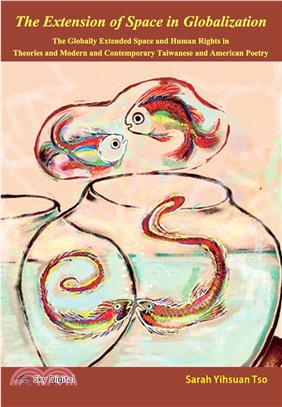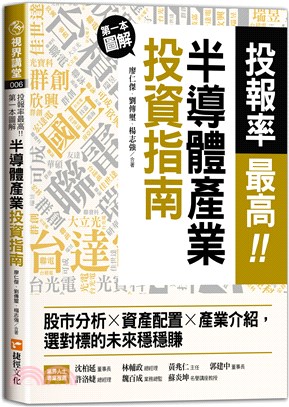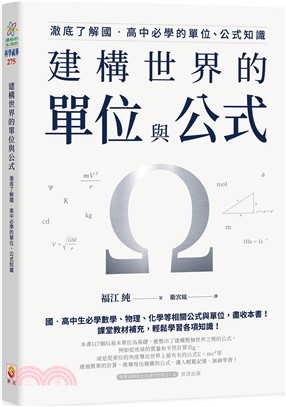定價
:NT$ 500 元優惠價
:95 折 475 元
領券後再享88折
領
團購優惠券B
8本以上且滿1500元
再享89折,單本省下52元
再享89折,單本省下52元
領
無庫存,下單後進貨(採購期約4~10個工作天)
可得紅利積點:14 點
相關商品
商品簡介
作者簡介
書摘/試閱
商品簡介
The Extension of Space in Globalization: The Globally Extended Space and Human Rights in Theories and Modern and Contemporary Taiwanese and American Poetry explores theories on space and theories on human rights in the globally extended space in Part I and canvasses modern and contemporary Taiwanese and American poetry on the globally extended space in Part II, citing theories and poetry, and commenting on cultures. This book raises large theoretical questions about the solely national and local definitions of space, human rights, and literature. In Chapter 2 and Chapter 3, Part I of this book, Sarah Yihsuan Tso argues that space and human rights, sites of contestation, are global-cum-local in various dimensions and are deterritorializing. Tso maintains in Chapters 4 to 6, Part II of this book, that modern and contemporary Taiwanese and American poetry illuminates the impacts of the globally extended space on freedom, the human mind, place, and poetics. Part II examines the poems expounding the globally extended space in globalization written by seven acclaimed major poets including Taiwanese poets Chou-yu Cheng, Wan-yu Lin, Hsiung Hung, Hsia Yu, and Yin Ling and American poets Jorie Graham and Bei Dao.
作者簡介
SARAH YIHSUAN TSO
is Associate Professor at National Taiwan Normal University.
is Associate Professor at National Taiwan Normal University.
書摘/試閱
Contents
Acknowledgments ix
Chapter1 Introduction 1
PartI Theories on Space and Human Rights in the Global Era
Chapter2 Multidimensional and Deterritorializing Space beyond the Nation-State: Theories on Space in the Global Era 21
Chapter3 National and Global Values: Theorizations of Human Rights in the Globally Extended Space 47
PartII The Extension of Space in Poetry
Chapter4 Taiwanese Poetry on the Globally Extended Space: Freedom, Territoriality, Nostalgia for Space, Solitude, Global Travel, Interconnectedness, and Fear 85
Chapter5 Jorie Graham’s Poetics of Interrelatedness 203
Chapte 6 Globalization and Universal Subjectivity in Bei Dao’s “Daydream” 227
Chapter7 Conclusion 259
Notes 273
Works Cited 275
Index 315
Chapter1 Introduction
Globalization’s impact on space has received prodigious critical attention, and I will give mine in this book. In this book, the extension of space is defined as the distension of space supranationally when space, beyond national territory, connects with physical space or cyberspace of another political entity, culture, or people. The Extension of Space in Globalization: The Globally Extended Space and Human Rights in Theories and Modern and Contemporary Taiwanese and American Poetry explores theories on space and theories on human rights in the globally extended space in Part I and canvasses modern and contemporary Taiwanese and American poetry on the globally extended space in Part II, citing theories and poetry, and commenting on cultures. This book raises large theoretical questions about the solely national and local definitions of space, human rights, and literature. In Chapter 2 and Chapter 3, Part I of this book, I argue that space and human rights, sites of contestation, are global-cum-local in various dimensions and are deterritorializing. I maintain in Chapters 4 to 6, Part II of this book, that modern and contemporary Taiwanese and American poetry illuminates the impacts of the globally extended space on freedom, the human mind, place, and poetics. Part II examines the poems expounding the globally extended space in globalization written by seven acclaimed major poets including Taiwanese poets Chou-yu Cheng, Wan-yu Lin, Hsiung Hung, Hsia Yu, and Yin Ling and American poets Jorie Graham and Bei Dao. Their poetry on the globally extended space commends sacrifices for freedom or chronicles its redefinitions. Their poetry reflects on an array of the extension’s effects on the human mind including the intensification of solitude, the surfacing of the unconscious of the globetrotter, and nostalgia for territories, heritages, and space in childhood. And their poetry ponders global interrelatedness and its reverberations in poetics such as interconnectedness and openness.
In Part I, in addition to exploring current theories on space, I establish my own theories on space including the three dimensions of space (haecceitic dimension, social dimension, and social and international dimensions), two secondary dimensions (affective secondary dimension and virtual secondary dimension), and four descriptors for my three dimensions of space―heterogeneity in composition and deterritorialization for the haecceitic dimension, relatedness including the relation of space to time for the social dimension, and interrelatedness for the social and international dimension. Moreover, in my own theory on freedom in the globally extended space, I argue that freedom is ensured or transformed in the globally extended space. My theories and terms clarify the impacts of local-global interconnectedness on spatiality and on the nation-state’s and people’s reevaluations of human rights such as freedom.
In Part II, I maintain that modern and contemporary Taiwanese and American poetry on the globally extended space delves into the outcomes of the extension of space including the securing or redefinition of freedom and factors aggravating or assuaging solitude such as frauds, the commercialization of human relationships, and global travel. The poetry also probes the dominances of the unconscious and space of childhood during global travel and nostalgia for territories and heritages and for space in childhood. Moreover, modern and contemporary Taiwanese and American poetry chronicles people’s fear about wars and global politics, the global intercon-nectedness among strangers, and interrelatedness. To explicate modern and contemporary Taiwanese and American poetry on the globally extended space, I coined my own literary terms including “the poetics of interrelatedness and openness” on interrelatedness, indeterminacy, and experimentality in Hsia Yu’s poetry; “poetics of interrelatedness” on the self’s intercon-nectedness with others in Graham’s poetry; “prodigal place” on a place laced with other places and times; and the “othering of place” on the presence of the absent other at a place, the last two terms for Graham’s poem “Event Horizon.”
The book has seven chapters and is divided into two parts, “Theories on Space and Human Rights in the Global Era” and “The Extension of Space in Poetry.” Part I, “Theories on Space and Human Rights in the Global Era,” propounds my theories on space and on freedom in the globally extended space and explores current theories on space and on human rights in two theoretical chapters. Part II, “The Extension of Space in Poetry,” examines the globally extended space in modern and contemporary Taiwanese and American poetry in another three chapters. Pronounced interconnections between Part I and II are commented on in Part II, whereas not all the theories in Part I are applied to the poetry in Part II.
This chapter, the introduction, advances my argument of the book and epitomizes its seven chapters. In Chapter 2, I maintain that space is multiscalar, deterritorialized, and multi-dimensional in current theories. In Chapter 2, my first contribution to theories on space is my conceptualization of the three dimensions of space―haecceitic, social, and social and international dimensions. Moreover, I argue that space has two secondary dimensions including its affective and virtual secondary dimensions. The affective secondary dimension is within the social dimension of space. The virtual secondary dimension belongs to the social and international dimension of space. My other contributions to spatial theories are my descriptors for my three dimensions of space. In my conceptualization, space in the haecceitic dimension is heterogeneous in composition and deterri-torializing. Relatedness is the descriptor of the social dimension. Interrelatedness is the descriptor of the social and international dimension of space.
In addition, most of the recent theories on people in space deal with the haecceitic dimension of space and, in my two descriptors, its heterogeneity in constitution and deterritorialization. Moreover, recent literary theories on space conceive space as ontological, cultural, and deterritorialized. Furthermore, recent scholarship defines globalization as changes and as its dimensions. The current consensus among scholars, I suggest, defines globalization in its two impacts or dimensions, interrelatedness and interdependency.
In Chapter 3, I maintain that in the age of globalization, since no later than the 1980s, the extension of space safeguards or redefines human freedom. In the globally extended space, global politics and transnational and global institutions and organizations as well as national institutions and groups redefine freedom and its enactment. Human rights are local-cum-global values within the nation-state and in the globally extended space of global civil society because human rights are abstract values, national values, and international and global values in my three dimensions. To scholars, freedom, a human right, is an ethical value as it is a moral, legal, and political value in the globally extended space with a trove of discordant definitions (Frost 75-77; Moyn, The Last 226-27). Next, on the voices or movements countering or endorsing human rights, Chapter 3 suggests that human rights are not adversarial to nationalism in a nation-state, or to isolationism in the globally extended space. Ideologies or people object to human rights because in the globally extended space human rights flow with fewer barriers than politics and people as Manuel Castells and Zygmunt Bauman both contend (Bauman, “Media” 301). My analysis in Chapter 3 suggests that anti-globalization movements and ideologies can be neutral to human rights, defend human rights, or infringe human rights. Moreover, the topic of this book, globalization, is intersectional and inclusive as a field and an approach for innumerable scholars across disciplines.
The globally extended space and freedom in the globally extended space are also central themes in modern and contemporary Taiwanese and American poetry and will be treated in Part II of the book. Chapter 4, “Taiwanese Poetry on the Globally Extended Space: Freedom, Territoriality, Nostalgia for Space, Solitude, Global Travel, Interconnectedness, and Fear,” examines poetry on the globally extended space in globalization published after the 1950s and written by Taiwanese poet Chou-yu Cheng and Taiwanese woman poet Wan-yu Lin as well as by other poets including Taiwanese women poets Hsiung Hung, Hsia Yu, and Yin Ling. These poets’ agendas on the globally extended space include the valorization and transformation of freedom, territoriality and the borders of the nation-state, nostalgia for space, solitude, global travel, jet lag, space lag, global interconnectedness, and fear confronting wars and global politics. Chou-yu Cheng emblazons sacrifices for freedom on the globe and identifies three issues concerned with the territoriality of the nation-state in the globally extended space including sojourning, national security, and diaspora. He disapproves of border trespassing and delves into the nostalgia for national territories and for the heritages of culture and the Chinese language. Both Wan-yu Lin’s and Hsia Yu’s poetry on the globally extended space suggests that global interconnectedness is based on material conditions such as the Internet, capitalism, and global travel. In the first account, Wan-yu Lin’s poetry suggests that modern people’s loneliness intensifies because of impostures on the Internet and the commercialization of human relationships in both virtual and physical space. In the second, Wan-yu Lin’s poetry suggests global travel as a remedy for this solitude to a certain extent. Hsia Yu’s poetry in her book of poems First Person construes the global interconnectedness among strangers in a poetics of interrelatedness and openness, my coined term.
Taiwanese woman poet Hsiung Hung’s poem “Writing a Poem in Jet Lag” dissects the dominance of the unconscious in jet lag and the ascendancy of the space of childhood in space lag for a globetrotter or a long-distance traveler, and defines nostalgia as pining for space of childhood. The poem “A White Dove Flew Over” written by Yin Ling commentates on the redefinition of freedom in the globally extended space more by global politics than by the nation-state and adumbrates that fear is people’s cardinal emotion about wars and global politics in the globally extended space.
Moreover, the globally extended space is affective, deterritorializing, related, interrelated, and virtual in Taiwanese poetry’s ideas of space examined in Chapter 4. For example, the globally extended space is affective in Chou-yu Cheng’s poem “Celeste Sky.” The globally extended space is deterritorializing in the poems written by Chou-yu Cheng, Wan-yu Lin, Hsia Yu, and Yin Ling. One of the two descriptors of my haecceitic spatial dimension also suggests that the globally extended space is deterritorializing. In Wan-yu Lin’s poetry and Hsiung Hung’s poem “Writing a Poem in Jet Lag,” the globally extended space is related and affective. In addition, the globally extended space is interrelated and virtual in Wan-yu Lin’s and Hsia Yu’s poetry.
Furthermore, Chou-yu Cheng’s poems “The Eternity of Václavské Square” and “You Did Not Return from the Trip” attest to my theory in the third chapter contending that the extension of space redefines or secures freedom. The poem “A White Dove Flew Over” written by Yin Ling corroborates my theory in Chapter 3 that human rights including freedom transform in the globally extended space, in the instances in this poem more by global politics than by nation-states. The poetry on freedom and human rights written by Chou-yu Cheng, Hsia Yu, and Yin Ling examined in Chapter 4 evokes all three of my dimensions of human rights as abstract values, national values, and international and global values.
Chapter 5, “Jorie Graham’s Poetics of Interre-latedness,” and Chapter 6, “Globalization and Universal Subjectivity in Bei Dao’s ‘Daydream,’” compare two American poets, Graham and Bei Dao, writing in English and Chinese respectively. I argue in Chapter 5 that in an acute awareness of others owing to the intensified global interconnectedness, Graham espouses a poetics of interrelatedness, my coined term. I maintain in Chapter 6 that Bei Dao’s view of globalization illuminates the interrelatedness of literature. Bei Dao’s poem “Daydream” advances a universal subjectivity in Johann Gottlieb Fichte’s theory of free and rational human beings. Analyzed in Anthony Giddens’s theory of trust, my term of the othering of place, and Fichte’s theory of the relationship between the self and others, Graham’s and Bei Dao’s poetry testifies to literature’s and our intercon- nectedness in the globally extended space. The globally extended space is deterritorializing for Bei Dao and is interrelated for Graham. Human rights are abstract, international, and global values in Graham’s poem “Event Horizon.”
Chapter 7, the conclusion, revisits my argument about theories and literature on space and on freedom in the globally extended space. The last chapter explicates theories and terms on space and freedom in the globally extended space again and suggests future directions and agendas for research on space and globalization. One of the problematics already addressed by Chou-yu Cheng’s poetry is that the distending of space globally does not prevail over state power in all instances or encompass all national territories.
Acknowledgments ix
Chapter1 Introduction 1
PartI Theories on Space and Human Rights in the Global Era
Chapter2 Multidimensional and Deterritorializing Space beyond the Nation-State: Theories on Space in the Global Era 21
Chapter3 National and Global Values: Theorizations of Human Rights in the Globally Extended Space 47
PartII The Extension of Space in Poetry
Chapter4 Taiwanese Poetry on the Globally Extended Space: Freedom, Territoriality, Nostalgia for Space, Solitude, Global Travel, Interconnectedness, and Fear 85
Chapter5 Jorie Graham’s Poetics of Interrelatedness 203
Chapte 6 Globalization and Universal Subjectivity in Bei Dao’s “Daydream” 227
Chapter7 Conclusion 259
Notes 273
Works Cited 275
Index 315
Chapter1 Introduction
Globalization’s impact on space has received prodigious critical attention, and I will give mine in this book. In this book, the extension of space is defined as the distension of space supranationally when space, beyond national territory, connects with physical space or cyberspace of another political entity, culture, or people. The Extension of Space in Globalization: The Globally Extended Space and Human Rights in Theories and Modern and Contemporary Taiwanese and American Poetry explores theories on space and theories on human rights in the globally extended space in Part I and canvasses modern and contemporary Taiwanese and American poetry on the globally extended space in Part II, citing theories and poetry, and commenting on cultures. This book raises large theoretical questions about the solely national and local definitions of space, human rights, and literature. In Chapter 2 and Chapter 3, Part I of this book, I argue that space and human rights, sites of contestation, are global-cum-local in various dimensions and are deterritorializing. I maintain in Chapters 4 to 6, Part II of this book, that modern and contemporary Taiwanese and American poetry illuminates the impacts of the globally extended space on freedom, the human mind, place, and poetics. Part II examines the poems expounding the globally extended space in globalization written by seven acclaimed major poets including Taiwanese poets Chou-yu Cheng, Wan-yu Lin, Hsiung Hung, Hsia Yu, and Yin Ling and American poets Jorie Graham and Bei Dao. Their poetry on the globally extended space commends sacrifices for freedom or chronicles its redefinitions. Their poetry reflects on an array of the extension’s effects on the human mind including the intensification of solitude, the surfacing of the unconscious of the globetrotter, and nostalgia for territories, heritages, and space in childhood. And their poetry ponders global interrelatedness and its reverberations in poetics such as interconnectedness and openness.
In Part I, in addition to exploring current theories on space, I establish my own theories on space including the three dimensions of space (haecceitic dimension, social dimension, and social and international dimensions), two secondary dimensions (affective secondary dimension and virtual secondary dimension), and four descriptors for my three dimensions of space―heterogeneity in composition and deterritorialization for the haecceitic dimension, relatedness including the relation of space to time for the social dimension, and interrelatedness for the social and international dimension. Moreover, in my own theory on freedom in the globally extended space, I argue that freedom is ensured or transformed in the globally extended space. My theories and terms clarify the impacts of local-global interconnectedness on spatiality and on the nation-state’s and people’s reevaluations of human rights such as freedom.
In Part II, I maintain that modern and contemporary Taiwanese and American poetry on the globally extended space delves into the outcomes of the extension of space including the securing or redefinition of freedom and factors aggravating or assuaging solitude such as frauds, the commercialization of human relationships, and global travel. The poetry also probes the dominances of the unconscious and space of childhood during global travel and nostalgia for territories and heritages and for space in childhood. Moreover, modern and contemporary Taiwanese and American poetry chronicles people’s fear about wars and global politics, the global intercon-nectedness among strangers, and interrelatedness. To explicate modern and contemporary Taiwanese and American poetry on the globally extended space, I coined my own literary terms including “the poetics of interrelatedness and openness” on interrelatedness, indeterminacy, and experimentality in Hsia Yu’s poetry; “poetics of interrelatedness” on the self’s intercon-nectedness with others in Graham’s poetry; “prodigal place” on a place laced with other places and times; and the “othering of place” on the presence of the absent other at a place, the last two terms for Graham’s poem “Event Horizon.”
The book has seven chapters and is divided into two parts, “Theories on Space and Human Rights in the Global Era” and “The Extension of Space in Poetry.” Part I, “Theories on Space and Human Rights in the Global Era,” propounds my theories on space and on freedom in the globally extended space and explores current theories on space and on human rights in two theoretical chapters. Part II, “The Extension of Space in Poetry,” examines the globally extended space in modern and contemporary Taiwanese and American poetry in another three chapters. Pronounced interconnections between Part I and II are commented on in Part II, whereas not all the theories in Part I are applied to the poetry in Part II.
This chapter, the introduction, advances my argument of the book and epitomizes its seven chapters. In Chapter 2, I maintain that space is multiscalar, deterritorialized, and multi-dimensional in current theories. In Chapter 2, my first contribution to theories on space is my conceptualization of the three dimensions of space―haecceitic, social, and social and international dimensions. Moreover, I argue that space has two secondary dimensions including its affective and virtual secondary dimensions. The affective secondary dimension is within the social dimension of space. The virtual secondary dimension belongs to the social and international dimension of space. My other contributions to spatial theories are my descriptors for my three dimensions of space. In my conceptualization, space in the haecceitic dimension is heterogeneous in composition and deterri-torializing. Relatedness is the descriptor of the social dimension. Interrelatedness is the descriptor of the social and international dimension of space.
In addition, most of the recent theories on people in space deal with the haecceitic dimension of space and, in my two descriptors, its heterogeneity in constitution and deterritorialization. Moreover, recent literary theories on space conceive space as ontological, cultural, and deterritorialized. Furthermore, recent scholarship defines globalization as changes and as its dimensions. The current consensus among scholars, I suggest, defines globalization in its two impacts or dimensions, interrelatedness and interdependency.
In Chapter 3, I maintain that in the age of globalization, since no later than the 1980s, the extension of space safeguards or redefines human freedom. In the globally extended space, global politics and transnational and global institutions and organizations as well as national institutions and groups redefine freedom and its enactment. Human rights are local-cum-global values within the nation-state and in the globally extended space of global civil society because human rights are abstract values, national values, and international and global values in my three dimensions. To scholars, freedom, a human right, is an ethical value as it is a moral, legal, and political value in the globally extended space with a trove of discordant definitions (Frost 75-77; Moyn, The Last 226-27). Next, on the voices or movements countering or endorsing human rights, Chapter 3 suggests that human rights are not adversarial to nationalism in a nation-state, or to isolationism in the globally extended space. Ideologies or people object to human rights because in the globally extended space human rights flow with fewer barriers than politics and people as Manuel Castells and Zygmunt Bauman both contend (Bauman, “Media” 301). My analysis in Chapter 3 suggests that anti-globalization movements and ideologies can be neutral to human rights, defend human rights, or infringe human rights. Moreover, the topic of this book, globalization, is intersectional and inclusive as a field and an approach for innumerable scholars across disciplines.
The globally extended space and freedom in the globally extended space are also central themes in modern and contemporary Taiwanese and American poetry and will be treated in Part II of the book. Chapter 4, “Taiwanese Poetry on the Globally Extended Space: Freedom, Territoriality, Nostalgia for Space, Solitude, Global Travel, Interconnectedness, and Fear,” examines poetry on the globally extended space in globalization published after the 1950s and written by Taiwanese poet Chou-yu Cheng and Taiwanese woman poet Wan-yu Lin as well as by other poets including Taiwanese women poets Hsiung Hung, Hsia Yu, and Yin Ling. These poets’ agendas on the globally extended space include the valorization and transformation of freedom, territoriality and the borders of the nation-state, nostalgia for space, solitude, global travel, jet lag, space lag, global interconnectedness, and fear confronting wars and global politics. Chou-yu Cheng emblazons sacrifices for freedom on the globe and identifies three issues concerned with the territoriality of the nation-state in the globally extended space including sojourning, national security, and diaspora. He disapproves of border trespassing and delves into the nostalgia for national territories and for the heritages of culture and the Chinese language. Both Wan-yu Lin’s and Hsia Yu’s poetry on the globally extended space suggests that global interconnectedness is based on material conditions such as the Internet, capitalism, and global travel. In the first account, Wan-yu Lin’s poetry suggests that modern people’s loneliness intensifies because of impostures on the Internet and the commercialization of human relationships in both virtual and physical space. In the second, Wan-yu Lin’s poetry suggests global travel as a remedy for this solitude to a certain extent. Hsia Yu’s poetry in her book of poems First Person construes the global interconnectedness among strangers in a poetics of interrelatedness and openness, my coined term.
Taiwanese woman poet Hsiung Hung’s poem “Writing a Poem in Jet Lag” dissects the dominance of the unconscious in jet lag and the ascendancy of the space of childhood in space lag for a globetrotter or a long-distance traveler, and defines nostalgia as pining for space of childhood. The poem “A White Dove Flew Over” written by Yin Ling commentates on the redefinition of freedom in the globally extended space more by global politics than by the nation-state and adumbrates that fear is people’s cardinal emotion about wars and global politics in the globally extended space.
Moreover, the globally extended space is affective, deterritorializing, related, interrelated, and virtual in Taiwanese poetry’s ideas of space examined in Chapter 4. For example, the globally extended space is affective in Chou-yu Cheng’s poem “Celeste Sky.” The globally extended space is deterritorializing in the poems written by Chou-yu Cheng, Wan-yu Lin, Hsia Yu, and Yin Ling. One of the two descriptors of my haecceitic spatial dimension also suggests that the globally extended space is deterritorializing. In Wan-yu Lin’s poetry and Hsiung Hung’s poem “Writing a Poem in Jet Lag,” the globally extended space is related and affective. In addition, the globally extended space is interrelated and virtual in Wan-yu Lin’s and Hsia Yu’s poetry.
Furthermore, Chou-yu Cheng’s poems “The Eternity of Václavské Square” and “You Did Not Return from the Trip” attest to my theory in the third chapter contending that the extension of space redefines or secures freedom. The poem “A White Dove Flew Over” written by Yin Ling corroborates my theory in Chapter 3 that human rights including freedom transform in the globally extended space, in the instances in this poem more by global politics than by nation-states. The poetry on freedom and human rights written by Chou-yu Cheng, Hsia Yu, and Yin Ling examined in Chapter 4 evokes all three of my dimensions of human rights as abstract values, national values, and international and global values.
Chapter 5, “Jorie Graham’s Poetics of Interre-latedness,” and Chapter 6, “Globalization and Universal Subjectivity in Bei Dao’s ‘Daydream,’” compare two American poets, Graham and Bei Dao, writing in English and Chinese respectively. I argue in Chapter 5 that in an acute awareness of others owing to the intensified global interconnectedness, Graham espouses a poetics of interrelatedness, my coined term. I maintain in Chapter 6 that Bei Dao’s view of globalization illuminates the interrelatedness of literature. Bei Dao’s poem “Daydream” advances a universal subjectivity in Johann Gottlieb Fichte’s theory of free and rational human beings. Analyzed in Anthony Giddens’s theory of trust, my term of the othering of place, and Fichte’s theory of the relationship between the self and others, Graham’s and Bei Dao’s poetry testifies to literature’s and our intercon- nectedness in the globally extended space. The globally extended space is deterritorializing for Bei Dao and is interrelated for Graham. Human rights are abstract, international, and global values in Graham’s poem “Event Horizon.”
Chapter 7, the conclusion, revisits my argument about theories and literature on space and on freedom in the globally extended space. The last chapter explicates theories and terms on space and freedom in the globally extended space again and suggests future directions and agendas for research on space and globalization. One of the problematics already addressed by Chou-yu Cheng’s poetry is that the distending of space globally does not prevail over state power in all instances or encompass all national territories.
主題書展
更多主題書展
更多書展本週66折
您曾經瀏覽過的商品
購物須知
為了保護您的權益,「三民網路書店」提供會員七日商品鑑賞期(收到商品為起始日)。
若要辦理退貨,請在商品鑑賞期內寄回,且商品必須是全新狀態與完整包裝(商品、附件、發票、隨貨贈品等)否則恕不接受退貨。















































